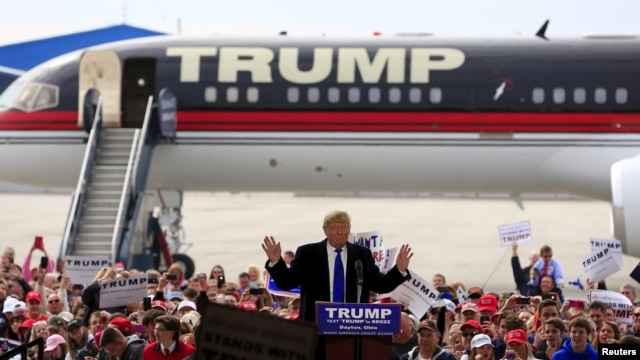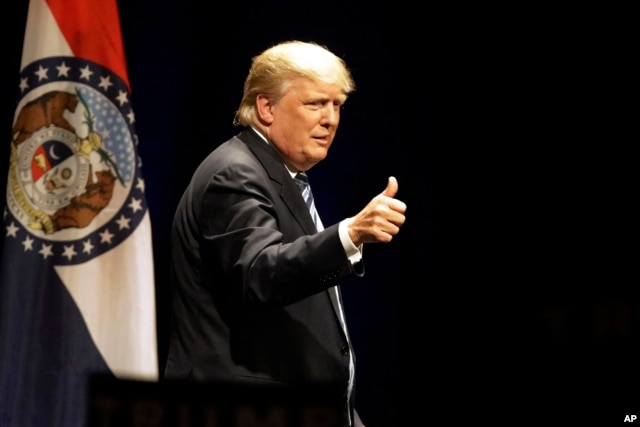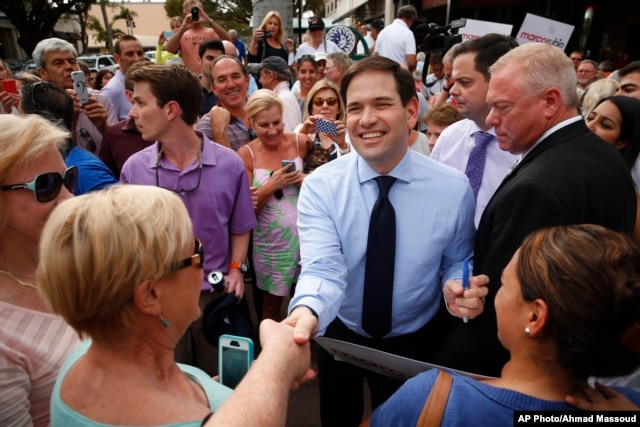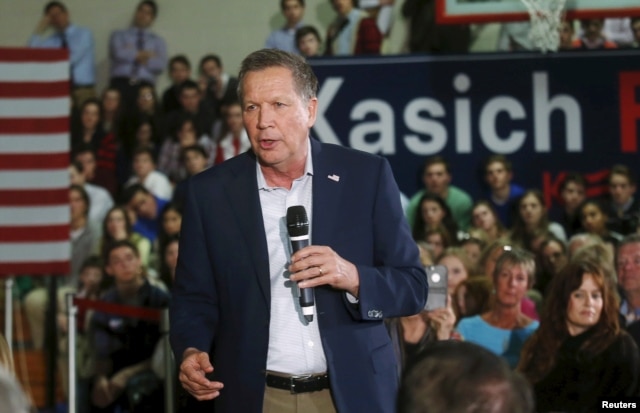News / USA
Democrats Condemn Chicago Trump Rally Chaos
Secret Service agents surround U.S. Republican presidential candidate Donald Trump during a disturbance as he speaks at Dayton International Airport in Dayton, Ohio, March 12, 2016.
Last updated on: March 12, 2016 3:32 PM
U.S. Democratic presidential candidate Hillary Clinton condemned Republican front-runner Donald Trump's "dangerous" campaign rhetoric Saturday, calling on voters to stand up to "this tide of bullying and bigotry and blustering," following the previous night's chaotic protests at a Trump rally in Chicago.
"If you play with matches, you're going to start a fire you can't control," Clinton told campaign volunteers in St. Louis.
President Barack Obama, speaking at a fundraiser in Dallas, added to the criticism, saying candidates running for office should be focused on making America "even better, not insults and schoolyard taunts and manufacturing facts, not divisiveness along the lines of race and faith, certainly not violence against other Americans."
Earlier in the day, Trump denounced the Chicago protest against him as "a disgrace" and "a planned attack," but his main Republican Party opponents said the tone of Trump’s campaign triggered such disruptions.
Trump said his supporters were taunted and harassed Friday evening in a disruption that he said was "professionally done."
"We've got to fight back," said Trump, who postponed the evening campaign rally at the University of Illinois at Chicago. The state's Republican and Democratic parties are scheduled to have primary elections on Tuesday.
Republican presidential candidate Donald Trump acknowledges supporters’ applause at a campaign rally in St. Louis, Mo., March 11, 2016.
Campaigning Saturday in the nearby state of Ohio, the wealthy businessman declared to an enthusiastic crowd in the city of Vandalia that he was calling on Democratic presidential candidate Bernie Sanders "to tell his people to stop" their anti-Trump activities.
Some protesters in Chicago had confronted Trump supporters while chanting "Bernie, Bernie" – a reference to the U.S. senator from Vermont. However, there was no indication they were sent or organized by his campaign team, which is focused on his political battle with former Secretary of State Hillary Clinton for the Democratic Party's presidential nomination.
Dozens of protesters entered the Chicago arena, shouting slogans at Trump supporters while thousands more massed outside the building, along with supporters of the front-running candidate.
After scuffles broke out, Trump released a statement announcing the rally was postponed and urging everyone to "go in peace." Police said they made five arrests; two officers were taken to the hospital with minor injuries.
"Donald Trump has created a toxic environment," his challenger, John Kasich, said in a news conference Saturday in Cincinnati, Ohio. Kasich is governor of that state, a key target for most of the Republican presidential hopefuls in Tuesday's primary election.
Kasich said he has tried to run a positive campaign during his presidential bid. Building a campaign around negative comments, Kasich said, is "lowering the bar on American politics, [which] is not acceptable."
Trump generally denounces protesters who wave signs or try to disrupt his campaign rallies, and asks for them to be removed from the scene. He had not arrived at the Chicago arena before Friday night's disorder erupted, but said later, "I think we made the right decision [to cancel] ... even though our freedom of speech was violated."
Trump's leading challenger, Texas Senator Ted Cruz, criticized the events in Chicago.
"When you have a campaign that affirmatively encourages violence, when you have a campaign that is facing allegations of physical violence against members of the press, you create an environment that only encourages this type of nasty discord," Cruz said.
In this March 11, 2016, photo, Republican presidential candidate, Sen. Marco Rubio, R-Fla. greets supporters in Naples, Fla.
Another rival, U.S. Senator Marco Rubio, said at a campaign event Saturday, "Last night in Chicago, we saw images that make America look like a Third World country."
Rubio, who has focused his campaigning this weekend on his home state of Florida, said such violence "is what happens when political candidates talk like people on Twitter."
Trump as unifier?
Following his string of victories in recent election contests, Trump has cast himself as a "unifier" of the Republican Party. But many have criticized his harsh rhetoric as hateful and noted he encouraged mistreatment of protesters at his rallies.
Large numbers of party delegates, who ultimately will select the official Republican candidate for president at a national convention in July, are at stake Tuesday.
Both Florida and Ohio are "winner-take-all" states, where election rules award all delegates to the primary election winner, in contrast to arrangements elsewhere where delegates are shared among multiple candidates on a proportional basis.
Rubio and Kasich both hope to defeat Trump in their home states, to prevent him from widening his lead in delegates pledging their support.
Republican U.S. presidential candidate John Kasich addresses an audience at a campaign stop in Grosse Pointe Woods, Mich., March 7, 2016.
Ohio battleground
Trump has had several scheduled campaign stops this weekend in Ohio. After two rallies Saturday – in Dayton and Cleveland – he was due to appear Sunday in Cleveland. A local Trump spokesman said that event had been cancelled because the Secret Service could not complete security preparations in time.
Opinion polls show Trump in a close race with Kasich in his home state. Trump has many supporters among white working-class voters. His blunt rhetoric and promise to "Make America Great Again" could attract workers anxious about stagnating wages and years of decline in industrial jobs in the so-called U.S. "Rust Belt."
Rubio releases voters in Ohio
Rubio is focusing his campaign on Florida at present. He has taken the unusual step of encouraging his supporters in Ohio to vote for his rival, Kasich, as a tactic to reduce Trump's chances of winning all the state's delegates.
"If a voter in Ohio concludes that voting for John Kasich gives us the best chance to stop Donald Trump there, I anticipate that's what they will do," said Rubio.
A Kasich campaign spokesman said the Ohio governor could win his home state without Rubio's help.
Rubio has seven planned events in Florida Saturday, Kasich has two town hall meetings in Ohio and Cruz will hold two rallies in Missouri.






No comments:
Post a Comment